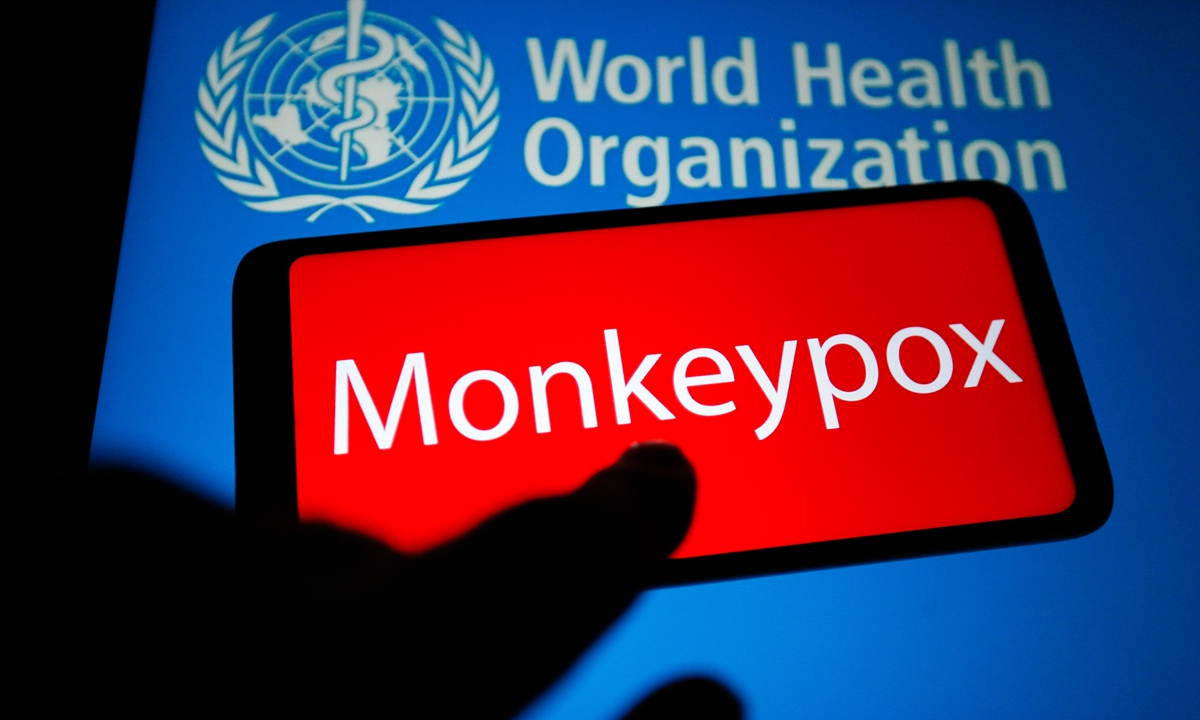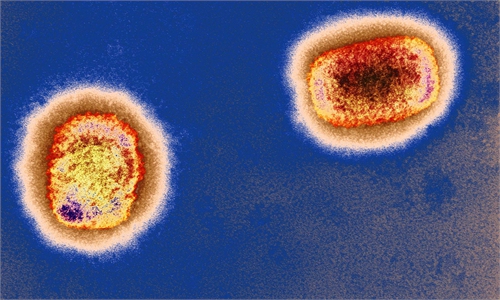
Monkeypox Photo: VCG
China's customs authorities said on Monday that monitoring for monkeypox has been stepped up, and they warned against the risk posed by the zoonotic infectious disease. According to the WHO, the disease poses a "moderate risk" to public health, and it is highly likely that even more countries will report cases.
In a statement sent to the Global Times by the General Administration of Customs (GAC), the authorities said they have organized expert teams to curb the risk posed by the monkeypox virus, and they plan to issue epidemic alerts accordingly.
Customs authorities at all levels will enhance their monitoring of the risk of monkeypox being imported into China. These practices will include checking the health of inbound personnel, as well as the quarantine of goods and rodents carried into the country, the GAC said.
"These steps are necessary to assess the risk of having monkeypox coming into our country. Just like how it is to defend against COVID-19, the detection of an infectious virus is the first step to contain its possible spread," Jiang Chunlai, a professor at Jilin University's School of Life Sciences, told the Global Times on Monday.
Li Taisheng, director of the Infectious Diseases Department in the Peking Union Medical College Hospital, told the Global Times that the causes of the monkeypox epidemic across continents are diverse. The number of people vulnerable to monkeypox has increased over the past 40 years, after the smallpox vaccination program stopped and immunity of those vaccinated has decreased over time.
Li added that as global travel and trade resumes, China's possibility of detecting imported monkeypox cases cannot be ruled out, so strengthening monkeypox-related quarantine and monitoring is necessary. Meanwhile, the possibility of a global monkeypox pandemic is low.
No confirmed cases of monkeypox have been reported in China yet, but as the situation worsens in other countries, the risk of imported cases will increase accordingly, experts from the Beijing Center for Disease Prevention and Control also said on Sunday.
People can be infected with monkeypox when bitten by infected animals, or when they come in contact with infected animal blood and other body fluids. Evidence also showed monkeypox could be transmitted among people through contact with an infected person's body fluids, with contaminated goods, or through face-to-face respiratory droplets.
As of May 26, a total of 257 laboratory-confirmed cases and around 120 suspected cases from 23 member states had been reported to the WHO. No deaths have been reported so far.
The WHO said the overall public health risk at the global level is assessed as moderate, but it is highly likely that even more countries will identify new cases.
The WHO attributed the sudden simultaneous occurrence of monkeypox in several non-endemic countries to undetected transmissions for some time, as well as recent amplifying events.
"The public health risk could become high if this virus exploits the opportunity to establish itself as a human pathogen and spreads to groups at higher risk of severe diseases such as young children and immunosuppressed persons," the WHO warned.
The GAC warned travelers to be aware of the risk of being exposed and infected. In monkeypox-prevalent areas, any contact with rodents, primates, animal blood or meat, or close contacts with monkeypox confirmed cases and their contaminated items, should be avoided.
If travelers have symptoms of fever, headache, muscle ache, swollen lymph nodes and an extensive rash, they should report to the customs, the GAC said.
The incubation period for monkeypox is usually six to 13 days, but it can range from five to 21 days. Initial symptoms include fever, muscle aches, swollen lymph nodes and chills. A widespread rash on the face and body could develop later.



